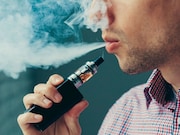Exposure levels higher than those found in combustible menthol cigarettes
TUESDAY, Sept. 17, 2019 (HealthDay News) — Users of mint- and menthol-flavored electronic cigarettes and smokeless tobacco are exposed to pulegone levels higher than what the U.S. Food and Drug Administration considers acceptable for intake of synthetic pulegone in food, according to a research letter published online Sept. 16 in JAMA Internal Medicine.
Sairam V. Jabba, D.V.M., Ph.D., and Sven-Eric Jordt, Ph.D., both from the Duke University School of Medicine in Durham, North Carolina, assessed the risk associated with pulegone by calculating the margin of exposure (MOE). The authors divided the FDA’s no observed adverse effect level of pulegone at which no treatment-related tumors were reported in animal studies (13.39 mg/kg of body weight/day) by the mean human exposure from mint- and menthol-flavored e-cigarette or smokeless tobacco products determined in U.S. Centers for Disease Control and Prevention studies.
The researchers found that for the e-liquid with the highest pulegone concentration, MOEs were between 1,298 and 3,084 for 5-mL daily consumption and between 325 and 771 for 20-mL daily consumption, which is below the safety threshold of 10,000. MOEs for the e-liquids ranged from 325 to 6,012, while for a pulegone-containing smokeless tobacco, they ranged from 549 to 1,646. Compared with menthol cigarette use (estimated to contain 0.037 to 0.290 µg/g of pulegone), daily pulegone exposure from e-cigarettes was higher across all user groups (ranging from 44 to 1,608 times higher). Compared with menthol cigarettes, estimated pulegone intake from smokeless tobacco was 168 to 1,319 times higher in light users and 126 to 990 times higher in heavy users.
“Our findings appear to establish health risks associated with pulegone intake and concerns that the FDA should address before suggesting mint- and menthol-flavored e-cigarettes and smokeless tobacco products as alternatives for people who use combustible tobacco products,” the authors write.
One author disclosed financial ties to the pharmaceutical industry.
Copyright © 2019 HealthDay. All rights reserved.








